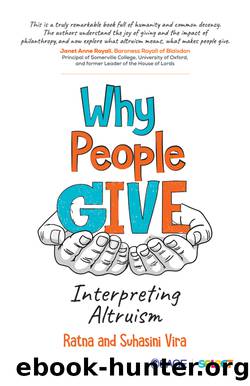Why People Give by Vira Ratna;Vira Suhasini;

Author:Vira, Ratna;Vira, Suhasini; [Vira, Ratna Vira and Suhasini]
Language: eng
Format: epub
Publisher: SAGE Publications India Pvt, Ltd.
Published: 2019-06-04T00:00:00+00:00
8
TRANSFORMING LIVES
CAN LEAD TO HAPPINESS
What we constantly aspire to be,
that in some sense we are.
âAnna Jameson
* * *
Happiness is sometimes associated with managing expectations. Are you happy with less only because you began with less? This is another central question in looking at altruism.
An indicator comes from evidence that it is the change in a personâs circumstance rather than the absolute position of success of the person that defines happiness. Self-improvement and success often occur together. But that does not necessarily mean they are the same thing. Our culture today is obsessively focused on unrealistically positive expectations: Be happier. Be healthier. Be the best, better than the rest. Be smarter, faster, richer, more popular and more admired. With this imagery comes low self-worth, as most of us are not able to meet our own expectations, because they march ahead just as we are reaching them.
Conventional self-help aims to discover a personâs limitations and work at the edges. We are focussing on what we do not have. It is like the Mist of Ignorance, with human beings wandering through the clouds, parting the mist to discover something else they lack. The obsession with progress has a fundamental assumption ⦠that you have space to progress, and therefore are in an unhappy place at the present.
Charities working with people at the edges of society do not have the luxury of offering progress as a hope. Sometimes people have to accept and live out the lives they have. And the smiles in these most depressing of situations show that happiness and fulfilment need not have a progress-focus all the time.
If you focus on your shortcomings and failures, then figure out ways to progress, you will always be unhappy. You will never reach the goal ⦠the state of happiness. The desire for more positive experience is itself a negative experience. And, paradoxically, the acceptance of oneâs negative experience is itself a positive experience.
At its core, the acceptance of what is, rather than changing it, is core to Buddhist and similar philosophies. Living in the present, accepting it, realizing that problems are often here to stay, by itself brings solutions. Problems sometimes do not go away, they just become better.
The other reality is that problems are rarely unique. If there is a problem, the chance is high that a lot of other people have had similar problems in the past, have them at present and are likely to have them in the future. The problem does not become any less for an individual if others have it too, no. What it means is that the problem is not unique to the individual and the person is not always a victim. This does not take away the severity of the problem but is often the first step in finding a solution to it.
Charitable social organizations usually work with people who have deep problems. Making the person realize that they are not alone sometimes leads to a way out. If not, then perhaps a better acceptance of reality, and therefore the space to find some happiness.
Download
This site does not store any files on its server. We only index and link to content provided by other sites. Please contact the content providers to delete copyright contents if any and email us, we'll remove relevant links or contents immediately.
| Anthropology | Archaeology |
| Philosophy | Politics & Government |
| Social Sciences | Sociology |
| Women's Studies |
Cecilia; Or, Memoirs of an Heiress — Volume 1 by Fanny Burney(32075)
Cecilia; Or, Memoirs of an Heiress — Volume 3 by Fanny Burney(31469)
Cecilia; Or, Memoirs of an Heiress — Volume 2 by Fanny Burney(31419)
The Great Music City by Andrea Baker(30797)
We're Going to Need More Wine by Gabrielle Union(18641)
All the Missing Girls by Megan Miranda(14788)
Pimp by Iceberg Slim(13798)
Bombshells: Glamour Girls of a Lifetime by Sullivan Steve(13698)
Fifty Shades Freed by E L James(12925)
Talking to Strangers by Malcolm Gladwell(12888)
Norse Mythology by Gaiman Neil(12861)
For the Love of Europe by Rick Steves(11558)
Crazy Rich Asians by Kevin Kwan(8898)
Mindhunter: Inside the FBI's Elite Serial Crime Unit by John E. Douglas & Mark Olshaker(8720)
The Lost Art of Listening by Michael P. Nichols(7170)
Enlightenment Now: The Case for Reason, Science, Humanism, and Progress by Steven Pinker(6879)
The Four Agreements by Don Miguel Ruiz(6324)
Bad Blood by John Carreyrou(6284)
Weapons of Math Destruction by Cathy O'Neil(5845)
